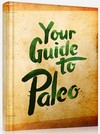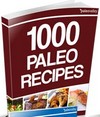This Review compares the most popular and best selling Paleo Diet Guides in 2019. All of them offer great value for money.
Unlike conventional Books these Guides come with many extras, such as Monthly Diet Plans, Videos, Desserts Recipes, Shopping Lists and related FREE Bonus eBooks.
| Guide Name | The Paleo Recipe Book | Paleo Diet Guides From Robb Wolf | Your Guide To Paleo | Caveman Feast (200+ Tantalizing Paleo Recipes) | 1000 Paleo Recipes |
|---|---|---|---|---|---|
| Picture |  |  |  |  |  |
| Our Rating | 1 (Best) | 3 | 4 | 5 | 2 |
| More Details |  |  |  |  |  |
| No of Recipes / Pages | 370+ Recipes | 30 Days of Recipes | 120+ Pages Guide | 200+ Recipes | 1000 Recipes |
| Included / Bonuses |
|
|
|
|
|
| Format | Digital eBooks | Digital eBooks | Digital eBooks | Digital eBooks + Video | Digital eBooks |
Few Interesting Facts about Paleo Diet You Should Know
Whether you are already familiar with the Paleo Diet or not, here are few key points.
Firstly, they briefly describe what the Paleo Diet is. Secondly, you may find answers to some of the most frequent questions concerning this modern approach to healthy eating.
What Are the Basics of Paleo Diet?
The basic principle of Paleo Diet is actually pretty simple. You can eat anything that was available as food to our ancestors before the Agriculture Era. You can eat it both raw and cooked.
What Foods are Paleo and Which Aren’t?
On the internet you can find many so called Paleo Food Lists. They tell you what foods are considered “paleo” and which are not.
In most cases you don’t need such lists. Just ask yourself a question: Could this food have been available to prehistoric people? If yes, then you can eat it, if not then you can’t.
Is Paleo Diet about Losing Weight or Enhancing Health?
The short answer is that it’s primarily about a healthy lifestyle.
The long answer is that it’s also about losing weight*. Well, the weight loss is not the main focus; it comes as “side effect”.
As you know, the Paleo Diet disallows all grains. The grains are mainly composed of carbs which is the prime culprit when it comes to weight gain*.
For many decades we’d been made to believe that eating fats makes us fat. As a result many diets to this day are focusing on cutting fat content in our foods. All the “light” and “zero fat” products are proof of that.
The latest knowledge suggests that it’s not the fat that makes people gain weight in the first place*. Fats, in fact are very important macronutrients. Your body needs them, especially your nervous system.
The primary reasons for obesity are sugars and their more complex counterparts – carbohydrates*. The good news is that all refined sugars as well as carbohydrates from grains are not allowed under the Paleo Eating.
Sure, you will still get some sugars from fruit, but not nearly close to what would you get from foods like breads, cereals and bakery products in general. And I am not even mentioning cakes, cookies and other processed high-sugar content foods.
What Are the Opponents of Paleo Diet Saying?
You may have heard a lot of praise about Paleo Diet from Paleo enthusiasts as well as lots of condemnation from conventional nutritionists and medical professionals.
So, who is right? Well, that’s up to the debate and further scientific proof. However, here is what we think…
They say: Paleo Diet can’t be right. If it was why ancient human lifespan was only around 30 years?
The Fact: Yes, the lifespan was shorter than today. However, the reason wasn’t the Diet. Palaeolithic humans encountered many dangers we do not face today.
They could have been eaten buy lions and other dangerous animals, die at birth due to lack of hygiene, get strong infection from cuts (remember no disinfectants were available during those times) and the list goes on.
It is estimated that at age 15, life expectancy of paleolithic people was an additional 39 years (total age 54)1.
However, there was one exception. These people were much healthier and didn’t experience any of today’s civilization diseases such as diabetes, Alzheimer or common autoimmune disorders.
They say: Paleo Diet is dangerous because of high protein content.
The Fact: Yes, too much protein can pose a risk to your health. This applies especially kidneys2 which are responsible for removing excess protein metabolites from blood. But it only happens if you have pre-existing medical condition.
More importantly, the Paleo diet is not high in protein at all. If you look at most Paleo recipes, they contain more vegetable ingredients than meats.
They say: Paleo Diet lacks many important nutrients.
The Fact: This is plain wrong. Paleo diet lacks mainly grains which are not nutrient dense. Grains contain a lot of saccharides. When it comes to nutrients like vitamins and minerals then meats and the right fruit and vegetables easily beat any grain-based foods.
If you want to check that for yourself, download our Free Nutrition Calculator and make a comparison.
They say: Paleo is just another modern trend Diet. As many other, it came and it will go.
The Fact: Yes, many “modern” diets are questionable. Most of them have one thing in common. They focus on removing some of the macronutrients, be it fat, sugar and so on.
Paleo Diet is different. Yes, it does limit sugars and carbohydrates, but it does not exclude them. Nor does it exclude any other parts from a standard diet. It just focuses on the right balance. And it just happens that the right balance comes from our ancestors menu.
You may argue whether it is just a coincidence or if human genetic code actually adjusted itself over the millions of years of evolution to match the available food sources.
Conclusion
As you can see the Paleo Eating isn’t a rocket science, just a common sense. In fact, it’s the most natural eating style verified by the 2 million years of human evolution*.
If there was anything fundamentally wrong with it, humans would have surely not survived to these days.
Just the opposite is true. Diet rich in vitamins, minerals, proteins, fats and mild in sugars provided the means for humans to evolve from primitive primates into intelligent species.
If you try it, there is nothing you could do wrong. If you are keen to explore more about it, we recommend you check one of the Paleo Guides from our Comparison Chart at the beginning of this article.
Sources
1) High-Protein, Low-Carb Diets Explained
Reviewed by Michael W. Smith, MD on May 06, 2015
Hillard Kaplan, Kim Hill, Jane Lancaster, and A. Magdalena Hurtado (2000). “A Theory of Human Life History Evolution: Diet, Intelligence and Longevity”(PDF). Evolutionary Anthropology 9 (4): 156–185.doi:10.1002/1520-6505(2000)9:4<156::AID-EVAN5>3.0.CO;2-7. Retrieved 12 September 2010
Have you found us useful? Like, share or tweet about it!
